Recent years have been difficult ones for the Christian Church (Disciples of Christ).
One of the original “seven sisters” of mainline Protestant Christianity, the Indianapolis-based denomination has seen repeated declines in membership, attendance, and total number of congregations exacerbated by COVID. Their ability to minister as a denomination of nationwide reach is rapidly fading.
Like other mainline Protestant churches, the denomination reached its pinnacle approaching two million members in the mid-1960s. By 1993, that number had halved, and was again halved by the early 2010s.
By 2019, the DoC was down to 350,618 members and average attendance of 126,217, according to the denominational yearbook, smaller than the mid-sized Presbyterian Church in America (PCA), which reports 390,319 members.
COVID restrictions accelerated decline. In 2021 the DoC reported 281,348 members and attendance of 97,402. In 2022, membership again dropped to 277,864 and attendance of 89,894. This final number is the most troubling: many denominations reported some attendance rebound in 2022 after 2020-21 closures, although the gain varies widely. From 2019-2022, there was a 21 percent drop in membership, a cataclysmic rate of decline. These most recent statistics are from ALEX, a subscription-based database for the DoC.
Your tax-deductible gift helps our journalists report the truth and hold Christian leaders and organizations accountable. Give a gift of $30 or more to The Roys Report this month, and you will receive a copy of “Hurt and Healed by the Church” by Ryan George. To donate, click here.
Congregations have also declined (see chart below) from more than 8,000 to now number 3,624. Ministers have hovered around 7,000 since the early 1970s.

North American Context
Mainline Protestants have all experienced uninterrupted decline, as have two large conservative bodies, the Lutheran Church Missouri Synod beginning in the late 1990s, and the Southern Baptist Convention beginning in the mid-2000s.
There are exceptions: the Assemblies of God, Presbyterian Church in America (PCA) and a handful of smaller denominations, including the Wesleyan Church, report growth. Additionally, some “mainline-adjacent” conservative offshoots, like the Global Methodist Church and Anglican Church in North America, are adding to their numbers.
That said, these are denominational outliers in North America. Multiple religious landscape studies show increasing numbers of both “nones” and non-denominational Christians.
Not all denominations will survive this time period. The DoC is in a spiral and will likely halve its membership again by the close of the decade.
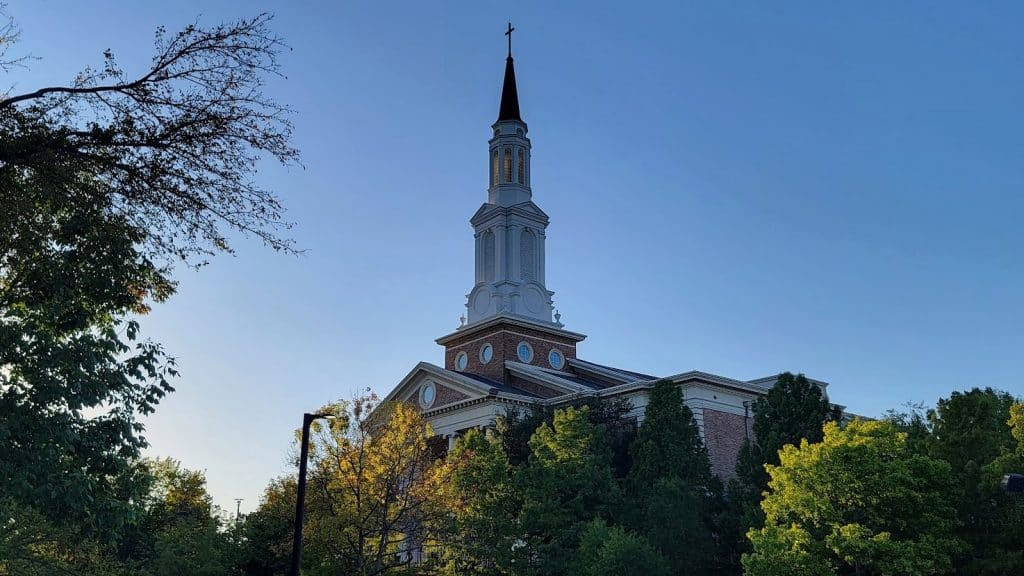
As reported by the Institute on Religion & Democracy, the United Methodist, Episcopal, and Presbyterian (USA) churches have experienced declines. Hard-hit by COVID restrictions, these three belatedly reopened to discover that a good number of their congregants had either dropped regular church attendance or had migrated to churches that more quickly resumed public worship. Each experienced a gradual level of uninterrupted decline across decades, but each continues to have a nationwide presence and a large, if diminished, membership.
That can no longer be said of the DoC. Heavily concentrated in the midwest, more than a third of the denomination’s members can be found in Kentucky, Indiana and Missouri, the early 19th century new frontier where Barton W. Stone, Thomas Campbell and his son, Alexander, ministered.
The Road Ahead
An important caveat to this report: nearly every denomination has pockets of vibrant ministry, and I do not expect that every Disciples congregation will be gone in the next decade. Far from it! But the Disciples struggle without a distinctive “brand” (partly due to the ecumenical nature of the movement that emphasized Christian unity).
Renewal organizations, including Disciple Heritage Fellowship, exist to support churches with a common heritage in the Stone-Campbell movement.
It is now common for me to run across other churches meeting in spaces that were once DoC church buildings, even in parts of the United States that experience population growth.
Disciples have firmly moved in a theologically revisionist direction on matters of human sexuality, gender expression, and radical individual moral autonomy. The 2023 General Assembly meeting in Louisville, Kentucky July 29-August 1, 2023 emphasized the “kin-dom of God” rather than God’s Kingdom.
Close to IRD’s offices in downtown Washington, the beautiful National City Christian Church was constructed in the 1930s as the denomination’s national church. Built to accommodate more than a thousand worshippers, the John Russell Pope-designed neoclassical structure is festooned with various iterations of pride/progress flags and Black Lives Matter signage. What it lacks is members, with online participants seeming to be the majority of those counted as attending services. Total membership dropped from 664 in 2019 to 275 in 2021.
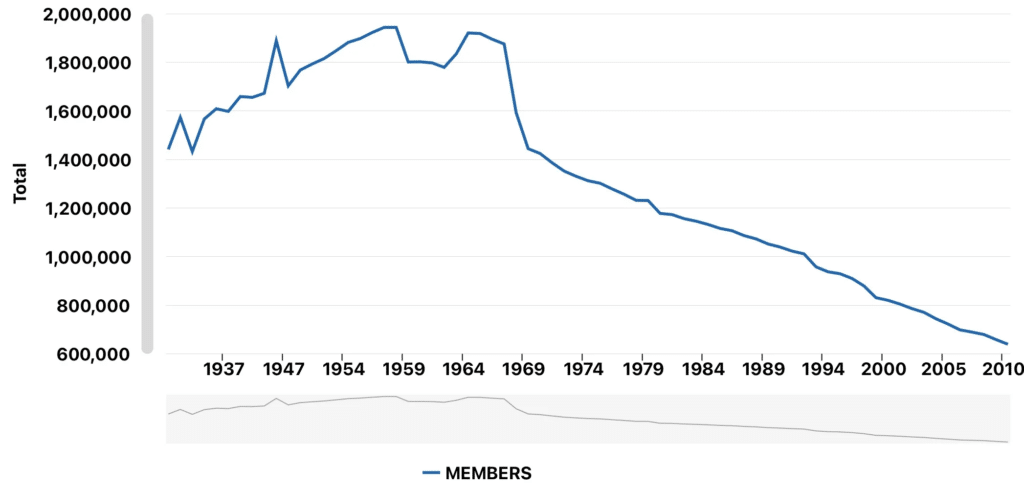
Chart data on clergy, members, and churches are taken from the National Council of Churches’ Historic Archive CD and print editions of the Council’s Yearbook of American and Canadian Churches. For more information visit the Association of Religion Data Archives.
This analysis, originally published at Juicy Ecumenism, does not necessarily reflect the views of The Roys Report.
Jeffrey Walton is Communications Manager and Anglican Program Director for the Institute on Religion & Democracy.




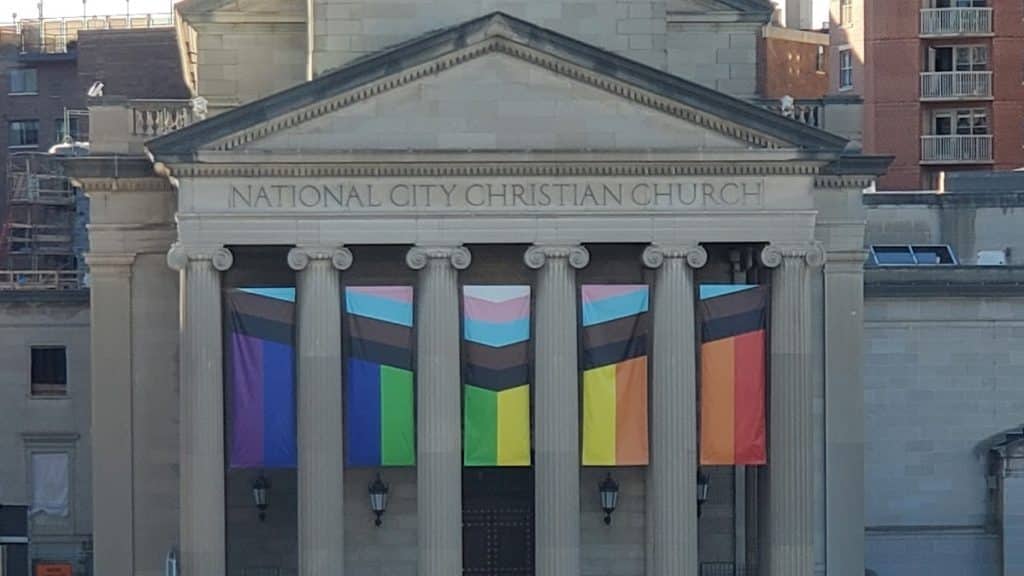

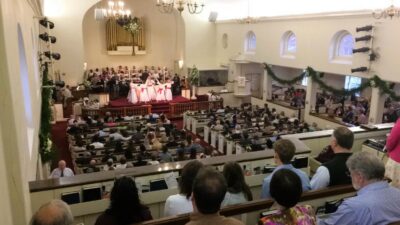
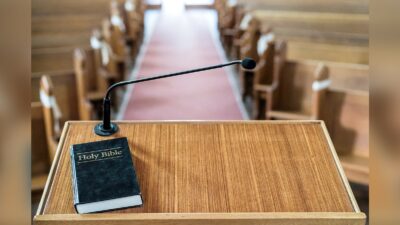




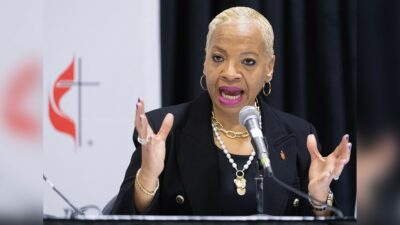







10 Responses
my confusion is always the same. Jesus died on the cross and resurrected for our salvation. then from around 300AD to NOW. Since then, thousands of denominations have been created all saying, “we have the inside scoop on what Jesus means when he speaks”. We need to go back to the basics. I do not attend formal Church. If my kids were still young, I would attend so they can get a good foundation. I do attend small group bible studies. I get way more out of that because I can raise my hand and ask to discuss something vs sitting for an hour then hitting the road. It’s just amazes me. Anybody have a thought on that?
You are on track Gary. Pulpit and pew dominated church is very disobedient to the Bible when “meeting together.” I was shocked to realize the verse always quoted “not forsaking meeting together” specifies the small group dynamic of “one another” communication, not the one hired Bible expert lecturing the Bible.
Hebrews 10:24-25
24 AND LET US (all of us)
CONSIDER HOW (prepare in advance of meeting)
to stir up ONE ANOTHER (dialogue, no lecture)
to LOVE AND GOOD WORKS, (not merely more knowledge)
25 not neglecting to MEET TOGETHER, (not just being in the same room)
as is the habit of some,
but encouraging ONE ANOTHER, (again, no sermon)
and ALL THE MORE
as you see the Day drawing near.
This is only one of many scriptures that are ignored by all clergy, and those who like to OUTSOURCE their assignment to “speak the truth in love” to a hired man. There is much more on your side. Keep growing in this.
I had a back to basics ‘call’ back in 2014. I returned to the scriptures as if reading for the first time and heavily depended on the Holy Spirit to guide and influence my understanding. Since then, I’ve adopted a new conceptualization of my Christian faith. For example, when in conversation, I don’t tell people that I’m a Christian, I tell them I’m a follower of Jesus Christ and His teachings (people have heard “I’m a Christian” and it doesn’t mean much these days). If I’m asked what church I attend, I respond that I’m a follower of Jesus and His teachings and try to attend a church that teaches me more about who Jesus is. I also have the need for worship and churches give me the chance to worship with others (in our culture this usually involves singing, something early Christians did notably) and to help/serve other Christians or nonbelievers. In conversation, I say that I’m not Baptist, Methodist, Presbyterian, Catholic, etc. I’m a follower of Jesus and I prefer to attend a church that may be able to teach me more about Jesus that I didn’t know before. But the key is, I’m doing my own study, hopefully humbly, and asking the Holy Spirit for help, and hopefully, that approach guides me past any church’s teaching that may be misguided. So, pretty simple overall and I do my best to stick to this approach. It has been very refreshing so far and seems to help me focus on what’s most important. Jesus apparently said, according to Matthew, “learn of me.” I hope this helps.
Gary, Tim, Mark, I really like what you guys are getting at. To identify with JESUS first and foremost, above any strong human leader, above any denomination, above any large church. Not to say we completely do away with these things, but they must no longer serve as earthly surrogates of our time, attention, and honor, instead of our heavenly Father, His son Jesus, and their Holy Spirit.
Chris, yep, it’s real simple and very refreshing approach.
The Christian Church (Disciples of Christ) has been very liberal for many years, and they will not be missed as they vanish from the religious scene. Here is an example of their liberalism from 10 years ago (membership was 600,000 in 2013, down to 277,864 in 2022).
https://www.christianpost.com/news/disciples-of-christ-church-votes-to-affirm-homosexuality-transgenderism-allows-openly-gay-leaders.html
The Wikipedia article on Disciples of Christ states that “Hierarchical doctrine was traditionally rejected by Disciples as human-made and divisive, and subsequently, freedom of belief and scriptural interpretation allows many Disciples to question or even deny beliefs common in doctrinal churches such as the Incarnation, the Trinity, and the Atonement.”
Hi Gary, we have similar views on denominations and their usefulness. I think that they persist because many people want to belong to a group with structure and rules and respond to an ‘us vs. them’ message, if for no other reason than being a motivator to attend. I think it is interesting that some megachurches have gone beyond denominations, partly because those individual churches and superstar preachers can have a culture distinctive enough to make their own ‘us vs. them’ distinction. People like to feel like they are part of something different, and denominations are one way to get there. I also think it is interesting to compare the work of Stone and Campbell that ended up with a denomination to Billy Graham, an itinerant who reached many people but did not actually start a church network.
DoC was not very relevant as a denomination. The Liberal/Progressive side of Protestantism was already crowded. The Restoration/Campbell-Stone Movement split 3 ways. 4 if you count the LDS/Mormons who initially had Campbell-Stone preacher Sidney Rigdon as one of their leaders. The other 2 branches, conservative Church of Christ Non-Instrumental and slightly conservative Christian Church/Church of Christ Instrumental, have done better. DoC learned that embracing Progressive theology and practice is the kiss of death with the embrace of the LGBTQ agenda dealing the coup de grace.
We left our congregation and the denomination in 2017. Sermons too often were painful attacks to Ann and me and joyful affirmations to others. I tried to tell our Minister that political conservatives feel and think and are not the stereotypes coming from media. I tried to talk to the General Minister – wanted to offer myself as a reader/listener to give her a conservative’s take on issues, not to edit or censor but rather to let her know how my group might feel about something. After a couple of message exchanges she stopped responding to me. I tried to do the same thing with our Regional Minister, asking him for some interview time. He also stopped responding.
I don’t know if I could have had any real impact, but I wanted to help save the denomination. Some people don’t want to be saved.
I left the Disciples when I realized they were antisemitic. This prompted me to publish an essay in The Times of Israel, warning the Jewish people about this denomination. I agree with Thomas, September 16th comment, if this apostate denomination vanished it won’t be missed.
Dave Arthun